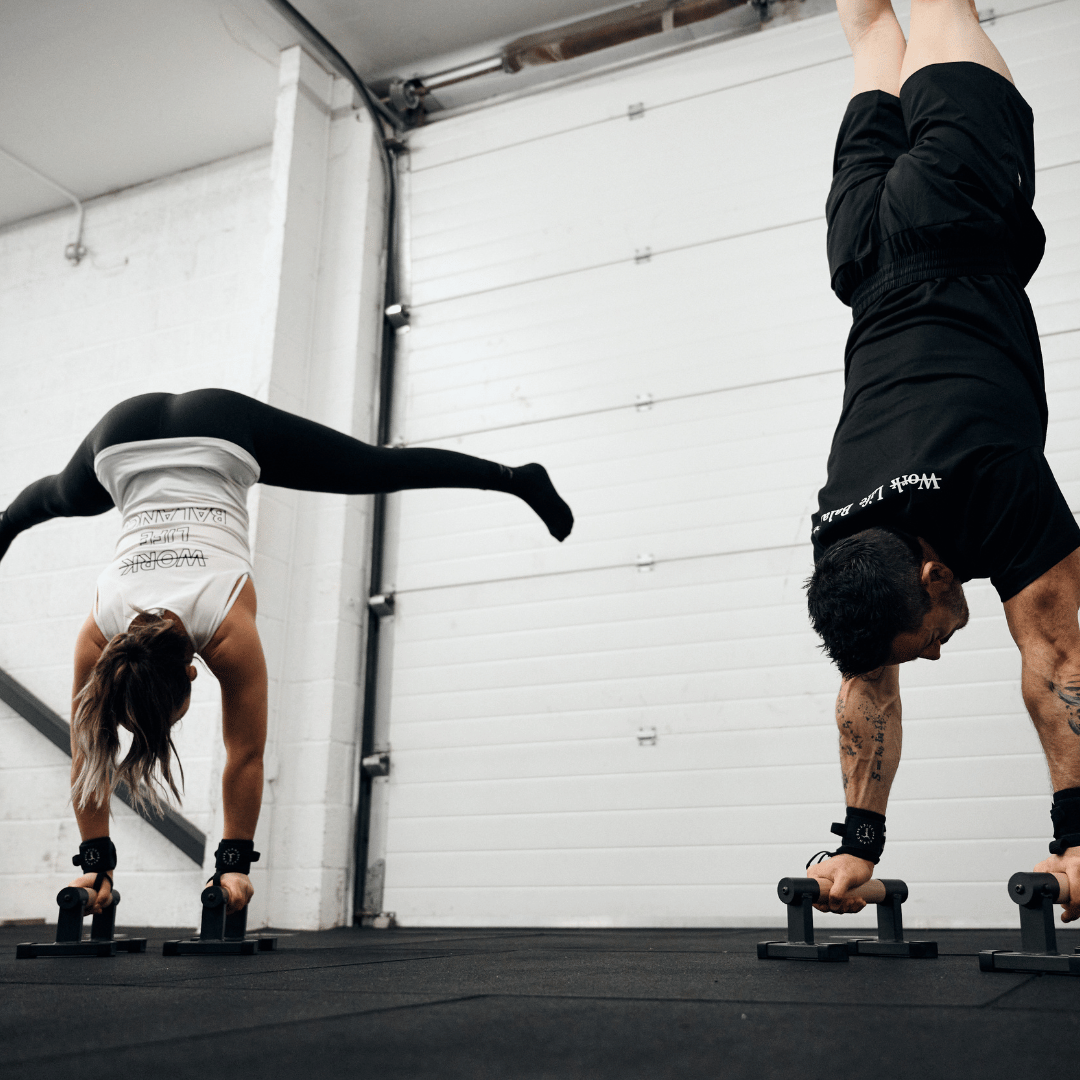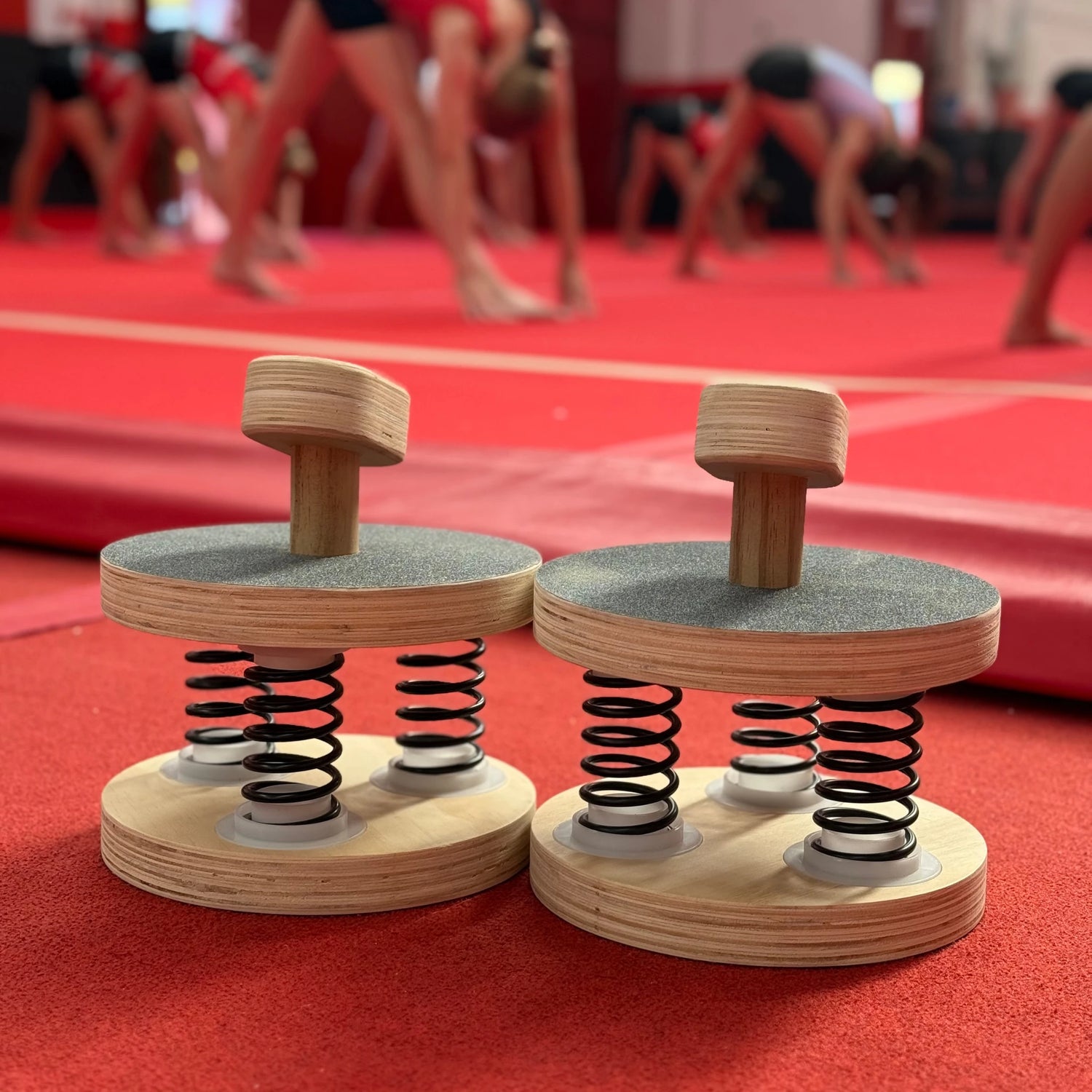
How to Master a Strict Handstand Push Up: Full Guide
|
|
Time to read 5 min

Check out our exciting new balance product launches. Developed and tested by...
|
|
Time to read 5 min
Mastering a strict handstand push up (HSPU) is an impressive feat of strength, balance, and control.
Handstand pushups are an advanced movement, often seen performed during gymnastics, and calisthenics, or in a crossfit gym. It requires more than just brute force; it demands a solid foundation of upper body strength, core strength, and proper technique.
Whether you’re aiming to add handstand push ups to your workout routine or preparing for a challenge like the CrossFit Games, this guide will walk you through every step of the way to mastering the strict handstand push-up .
A strict handstand push up involves lowering your own bodyweight from a fully extended handstand position until your head touches the ground, then pressing back up to the start.
Unlike kipping handstand push ups, which use momentum from the hips, the strict version requires pure strength and control.
Shoulder Muscles: The primary movers in the HSPU, especially the deltoids.
Triceps: Assist in pushing your body weight back up to the top position .
Upper Back and Shoulder Blades: Stabilize your entire body throughout the movement.
Core Muscles: Maintain a hollow body position , keeping your body in a straight line.
Lower Back: Supports the core and helps maintain a neutral position.
Before attempting your first strict handstand push up, it’s crucial to build a solid foundation of strength and technique. Here’s how:
Pike push ups are an excellent scaling option for beginners. This exercise mimics the handstand push up movement pattern without the full body weight demand.
How to Perform:
Start in a pike position with your hips raised, forming an inverted V-shape.
Place your hands shoulder-width apart.
Lower your head towards the ground in a controlled manner until it almost touches.
Push through your palms to return to the starting position.
Wall walks help you get comfortable with the handstand position while building the necessary upper body strength.
How to Perform:
Begin in a starting position similar to a regular push up, with your feet against the wall.
Walk your feet up the wall while moving your hands closer until your body is in a vertical plane.
Hold the top position for a few seconds, then walk back down in a controlled manner.
The shoulder press is a fundamental exercise for developing the necessary strength to press your body weight in a handstand. It’s a great way to focus on the pressing movement without the balance challenge of a handstand.
How to Perform:
Stand with feet shoulder-width apart, holding a barbell at your shoulders.
Press the barbell overhead until your arms are fully extended.
Lower the barbell back to your shoulders in a controlled manner.
A strong core is essential for maintaining the hollow body position in a handstand. Incorporate exercises like planks, hollow body holds, and leg raises into your training plan to build core stability.
Once you’ve built a solid foundation, it’s time to move on to more specific handstand push up training.
Practicing HSPUs against the wall helps you focus on the pressing motion without worrying about balance.
How to Perform:
Kick up into a handstand against the wall, with your hands placed shoulder-width apart.
Lower your head towards the ground in a controlled manner.
Press back up to the top position, maintaining a straight line from hands to toes.
Scaling Options:
If the full range of motion is too challenging, place yoga blocks under your head to reduce the distance.
Use a weighted vest for added resistance once you can perform multiple reps with ease.
To master the strict HSPU, you must be able to perform the movement through its full range of motion.
How to Perform:
Start in a handstand position against the wall.
Lower your head all the way to the floor, ensuring your elbows form a 90-degree angle.
Press back up, locking out your elbows at the top.
The final step in your journey is to perform HSPUs without wall support. This requires not only strength but also balance and coordination.
How to Perform:
Kick up into a freestanding handstand.
Lower yourself in a controlled manner until your head touches the ground.
Press back up to a full handstand, maintaining balance throughout the movement.
Achieving a strict handstand push up isn’t just about brute strength; proper form and technique are crucial to maximising efficiency and preventing injury.
Hand positions are critical for maintaining balance and generating power. Your hands should be placed just slightly wider than shoulder-width apart, with fingers spread out to create a stable base.
Engage your core to keep your body in a straight line. This not only helps with balance but also ensures that your shoulder muscles are working in the most efficient way possible.
Good shoulder mobility is essential for performing the full range of motion without compensating with your lower back. Regular stretching and mobility drills will help maintain a neutral position throughout the movement.
The bottom position of a handstand push up is where most people struggle. Lower yourself slowly and with control to maintain tension in your muscles and avoid collapsing.
Even with a solid foundation and good strength, there are common pitfalls that can hinder your progress. Here’s how to avoid them:
This usually occurs when your core isn’t engaged, leading to an overextension of the lower back.
Solution: Focus on maintaining a hollow body position by tucking your ribs and engaging your abs throughout the movement.
Letting your elbows flare out can lead to shoulder strain and reduce your pressing power.
Solution: Keep your elbows close to your body, pointing slightly forward as you press.
Jumping to advanced variations too quickly can lead to poor form and potential injury.
Solution: Take your time with each progression, ensuring you can perform multiple reps with proper technique before moving to the next level.
To master the strict handstand push up, consistency is key. Here’s a sample training plan to help you progress:
Shoulder Press: 4 sets of 8-10 reps
Pike Push-Ups: 4 sets of 10-12 reps
Core Work (Planks, Hollow Body Holds): 3 sets of 30-60 seconds each
Wall Walks: 4 sets of 4-5 reps
Wall-Supported Handstand Push-Ups: 3 sets of 6-8 reps
Freestanding Handstand Practice: 10 minutes of balance drills
Full Range of Motion HSPUs (Wall-Supported): 4 sets of 4-6 reps
Freestanding Handstand Push Ups: 3 sets of max reps
Mobility Work (Shoulders and Wrists): 10 minutes
Focus on stretching, foam rolling, and active recovery to keep your body healthy and ready for the next workout.
Once you’ve mastered the strict HSPU, you can challenge yourself with more advanced variations:
Weighted HSPUs: Use a weighted vest to add resistance.
Deficit HSPUs: Perform the exercise with your hands elevated on yoga blocks to increase the range of motion.
Freestanding HSPU Progressions: Work on performing multiple reps without wall support.
Mastering the strict handstand push up is a journey that requires hard work, dedication, and a well-structured training plan.
By focusing on building shoulder strength, core stability, and proper technique, you’ll be well on your way to achieving this impressive feat.
Remember, the only way to succeed with handstand push ups is through consistent practice and gradual progression. Start with the basics, refine your form, and push your limits step by step.
With time, effort, and patience, you’ll reach the pinnacle of your handstand journey and conquer the strict handstand push up with confidence and control.




